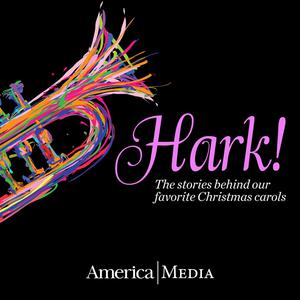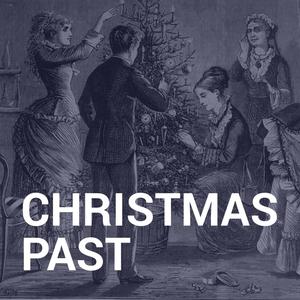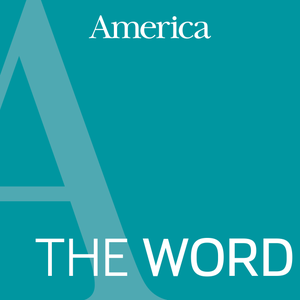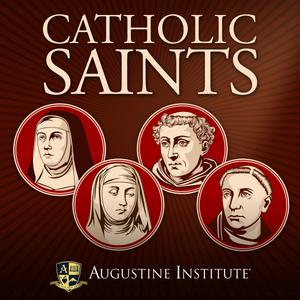
Hark! The stories behind our favorite Christmas carols
America Media
- 48 minutes 32 secondsWhat Child Is This?
On the final episode of Hark! this season, prepare yourselves for a wee bit of scandal because we’re looking at a tune that began as a bawdy love song and has long been associated with an evil monarch, but which, over the course of three centuries, finds its redemption as a Christmas carol. This is the story behind, “What Child Is This?”
Please complete our brief survey to share your hopes for Hark! and to let us know which carols you’d love us to feature next year.
“What Child Is This” may have been derived from a Christmas poem by William Chatteron Dix in the mid 19th century, but its musical roots stretch as far back as the 16th century, when its famous tune, “Greensleeves,” was circulated in Europe’s royal courts.
In an attempt to track the tune’s composer, and separate fact from fiction, Maggi Van Dorn brings on Milton Mermikides, the 37th Gresham Professor of Music at Gresham College, London.
Maggi is then joined by Richard Jeffrey-Gray, head of the music service for the Diocese of Clifton, Bristol, United Kingdom, who traces how the romantic ballad “Greensleeves” became the Christmas carol “What Child Is This,” along with what makes this, according to Richard, “one of the most, perfect tunes to to play and to sing.”
Susan Reynolds, a theologian at the Candler School of Theology at Emory University and mom of three girls, unpacks the rhetorical structure of the song’s lyrics and its profound theological implications for our world today.
The music featured on this episode was generously gifted to Hark! by Clifton Cathedral Choir, Bristol, U.K.; Nicholas Steinbach and Grey Duck Music; Holland Albright; Cynthia Boener; Michael Logozar and Brian Thiessen. With special thanks to Signum Records for providing renditions of the carol "What Child Is This" by the following artists signed to their label: King’s Singers, Armonico Consort, Matthew Barley and The London Cello Sound, featuring the 40 cellos of the London Philharmonic, Royal Philharmonic, BBC Symphony, and Philharmonia Orchestras.
Support Hark! by becoming a digital subscriber to America Magazine at: americamagazine.org/subscribe
This season of Hark! is sponsored by Saints for Sinners, offering divine saint medals imported from Italy and meticulously hand-painted in New Orleans.
Learn more about your ad choices. Visit megaphone.fm/adchoices
15 December 2024, 8:00 am - 44 minutes 34 secondsOf the Father’s Love Begotten
If you’re in search of an ancient, theologically rich carol this season, look no further than “Of the Father’s Love Begotten.” Long before it became a Christmas carol in the 19th century, this hymn was first penned as a poem in the 4th century by Aurelius Clemens Prudentius. As Brian Flanagan, theologian and church historian, explains, this was a time of significant turmoil in church history, with Christian doctrine being defined and refined through heated debates and councils. Prudentius’ poetry appears to have been a creative way of conveying some of the core teachings that emerged from the Council of Nicaea in 325 A.D. to the faithful.
The elegant verse was later paired with a Eucharistic hymn, thought to be from either the 10th or 13th century, and translated by the renowned Victorian composer John Mason Neale. This poem-hymn has thus endured over 1,500 years of history, proclaiming the mystery of the incarnation that we celebrate at Christmas. Host Maggi Van Dorn also welcomes back Colin Britt to help us appreciate the musical subtleties of this great work, and best-selling writer and novelist Nicole Baart shares why she chose to sing this carol on her wedding day.
We owe a great debt of thanks to Richard Jeffrey Gray and the members of the Clifton Cathedral Choir, accompanied by Stephen Bryant and directed by Dr. David Bednall; the Schola Cantorum of St. Peter’s in the Loop, directed by J. Michael Thompson; the Mount Holyoke Glee Club, conducted by Colin Britt; and Lori Pappajohn and Ricardo da Silva, S.J., for providing the music featured in this episode.
The show wraps with “Of the Father’s Heart Begotten,” arranged by Sir David Willcocks and performed by the Choir of King’s College, Cambridge, under the direction of Daniel Hyde. This recording is included on their album In the Bleak Midwinter, available through King’s Recordings.
Support Hark! by becoming a digital subscriber to America Magazine at: americamagazine.org/subscribe
This season of Hark! is sponsored by Saints for Sinners, offering divine saint medals imported from Italy and meticulously hand-painted in New Orleans.
Learn more about your ad choices. Visit megaphone.fm/adchoices
8 December 2024, 8:00 am - 53 minutes 20 secondsThe Little Drummer Boy
On this episode of “Hark!”, we follow the beat of a modern carol that has gained worldwide fame, yet was composed almost while napping. It is a tale about a figure the Bible never mentions, but whose bold gift leads us straight to the heart of Christmas. This is the story of “The Little Drummer Boy.”
First, Lisa Graham, the director of the choral program and a senior lecturer in music at Wellesley College, narrates how Wellesley alumna Katherine Kennicott Davis composed her “Carol of the Drum” in 1941 and how the college bid $11,000 in a battle to win the rights to the original manuscript.
Research historian Christian McWhirter, then unpacks the much-romanticized symbol of the drummer boy on the battlefield during the American Civil War. Finally, host Maggi Van Dorn, takes a music lesson with the incomparable liturgical composer, Christopher Walker, also the author of 12 books of stories and songs for children.
We are most grateful to our real-life drummer boy, Garrin Knapp, for interpreting and demoing the percussion elements of the carol, and for sharing what the song means to him. The soul-stirring solo of “The Little Drummer Boy" heard on this episode was specially recorded for “Hark!” by Frank Tuson, our very own sound engineer and composer of our theme score. The show wraps with a performance by The King’s Singers from their Christmas album, courtesy of Signum Records.
Midway through production on this episode, Hurricane Helene made landfall in Western North Carolina, where Maggi has called home for four years. This episode is dedicated to the ongoing relief efforts in the affected areas. Please consider making a donation to these reputable organizations:
BeLoved Asheville: a non-profit organization that has been boots on the ground since long before the hurricane and which will serve those on the margins long after.
ReString Appalachia: a movement dedicated to getting quality instruments back in the hands of those who lost them in the hurricane.
Support Hark! by becoming a digital subscriber to America Magazine at: americamagazine.org/subscribe
Please donate for Giving Tuesday! From all of us at America Media, thank you!
This season of Hark! is sponsored by Saints for Sinners, offering divine saint medals imported from Italy and meticulously hand-painted in New Orleans.
Learn more about your ad choices. Visit megaphone.fm/adchoices
2 December 2024, 5:03 pm - 1 hour 13 secondsWe Three Kings
To kick off the fourth season of “Hark! The stories behind our favorite Christmas carols” we’re embarking on an adventure to learn about an American-born carol that features some classic nativity characters—figures that, though very familiar to us, we know little about. It’s a Christmas song that begins on a plodding, somber note and erupts into a thrilling epiphany. We’re exploring “We Three Kings.”
To help us understand who the magi were—at least from the perspective of Matthew’s Gospel— host Maggi Van Dorn invites Eric Vanden Eykel, author of The Magi: Who They Are, How They’ve Been Remembered, and Why They Still Fascinate and Associate Professor of Religious Studies at Ferrum College.
The magi’s gifts of gold, frankincense and myrrh have long been viewed as symbolic of Jesus’ kingship, divinity and humanity, but how were these two herbs used in antiquity? Maggi learns about their earliest uses from Emiliana Patrick, a fourth year doctoral student in Classical Chinese Medicine at Daoist Traditions College in Asheville, North Carolina.
To trace the star the magi followed, Maggi turns to the director of the Vatican’s observatory, Guy Consolmagno, S.J., a Jesuit brother. Finally, to better appreciate the musical genius of the carol’s composition, she speaks with ContraForce, a folk metal band known for their eclectic range of musical styles at contra dances, who specially created an instrumental rendition of “We Three Kings,”specially for “Hark!,” that is woven throughout the episode.
The music featured in this episode is courtesy of ContraForce, Michael Logozar, Cynthia Boener, Dante Bucci, the Lee siblings of the Seasons band, Jeff Black and Lotos Nile Music. Special thanks to Jim Bilodeau, our sound engineer, and Jonathan Reid Gealt for lending their vocal talent.
Support Hark! by becoming a digital subscriber to America Magazine at: americamagazine.org/subscribe
Please donate for Giving Tuesday! From all of us at America Media, thank you!
This season of Hark! is sponsored by Saints for Sinners, offering divine saint medals imported from Italy and meticulously hand-painted in New Orleans.
Learn more about your ad choices. Visit megaphone.fm/adchoices
29 November 2024, 7:00 am - 48 minutes 44 secondsLo, How a Rose E’er Blooming
Our final episode of Hark! this season departs from the usual nativity of Christ in a manger, surrounded by shepherds and angels on high. Instead, our carol centers on the singular icon of a rose. “Lo, How a Rose E’er Blooming” is a German Christmas song, first published in a Lutheran hymnbook in 1599. Although its believed to be much older, originating in a Catholic monastery with an uncertain date and writer.
And not only do we not know who wrote the text for our carol. The person behind the basic melody is also a mystery. The music is often credited to Michael Praetorius, a German composer, organist and music theorist from the 16th and 17th Centuries. But, Praetorius didn't compose the main melody; he only added the harmonies that have made this “the rose of all carols” among choristers and music maestros.
Adding further to the mystery of this carol, the symbol of the rose is ambiguous. Depending on the translation and verse, the rose could represent Jesus or his mother Mary, who in Catholic mysticism is adorned with roses.
Our heartfelt thanks extends to every musician, choir and soloist who gifted their music so generously to Hark! this season. On this episode we are especially grateful to:
The Choir of King’s College Cambridge, The Ignatian Schola, Cynthia Boener, Katie Green and Karen Hefford, Barbara Rowe for sharing the music of her husband, the late Bryan Rowe, Gary Cope and the Encomium Ensemble, the music department of Hope College in Holland, Michigan, Stephen Lynerd, Winter Harp and The Notre Dame Folk Choir, under the direction of JJ Wright, who walked us through the music of “Lo How A Rose” on this episode.
Special thanks to the Benedictine monks of Saint John's Abbey Schola in Collegeville, Minnesota. In particular to Father Nick Kleespie who coordinated the performance of Father Anthony Ruff's arrangement of “Lo, How a Rose,” featured in this episode. To learn more about the monks of Saint John’s Abbey, please visit saintjohnsabbey.org.
Support “Hark!” become a digital subscriber of America Magazine at: https://link.chtbl.com/04Jrg99F
Learn more about your ad choices. Visit megaphone.fm/adchoices
17 December 2023, 5:00 am - 49 minutes 42 secondsGo Tell It on the Mountain
We’re looking at a song that is indisputably a Christmas carol but with a reach that extends to every season – “Go Tell It on the Mountain.” It belongs to a collection of historic Negro Spirituals, which likely started on the slave plantations in the American South and were later picked up in the Civil Rights Movement by activists like Fannie Lou Hamer and later, The Freedom Singers.
“Go Tell It on the Mountain” has been performed by a multitude of heavenly singers and we were lucky enough to speak to one such star- Vanessa Williams- about why she chose to feature the carol on her 1996 Christmas album, Star Bright. Maggi Van Dorn, Hark’s host, also garnishes rich cultural and theological insight from Catholic liturgical heavyweight, Eric Styles, along with expert music and history lessons from the wildly talented Emorja Roberson, Assistant Professor of Music and African-American Studies at the Oxford College of Emory University.
The music featured in this episode is thanks to The OK Factor, Caleb Noeldner, Kendra Logozar, Kim and Reggie Harris, Vanessa Williams, and Universal Music Enterprises. Special thanks to Pauline Books and Media for the recording of “Go Tell It on the Mountain” by Servant of God Sister Thea Bowman, F.S.P.A. We're grateful to Emorja Roberson for providing commentary and his singing voice throughout, and to Frank Tuson for his audio wizardry as the engineer on this episode. Frank also composed the Hark! theme music and successfully convinced members of his family to record “Down to the River,” heard on this episode.
Support “Hark!” become a digital subscriber of America Magazine at: https://link.chtbl.com/04Jrg99F
Or you can play a little reindeer game with us and win a subscription to America!
At the end of this episode, we’ve left a clue about next week’s carol. Guess the carol in an Instagram post, tag three friends, and follow @americamedia, and you will be entered to win a one-year digital subscription to America.
No purchase necessary. Open to U.S. residents only 18 and older. Prize value is $49.99 each. Promotion period November 26 to December 22, 2023. Twenty winners will be randomly selected and notified by D.M. by January 10, 2023. Instagram does not endorse this giveaway.
Learn more about your ad choices. Visit megaphone.fm/adchoices
14 December 2023, 5:10 am - 45 minutes 42 secondsThe Wexford Carol
“The Wexford Carol” is heralded as Ireland’s oldest recorded Christmas carol. It’s been performed by world class cellist Yo-Yo Ma and American country music star Allison Krauss. Yet, the history of this carol is difficult to trace. We know that it was passed down in the oral tradition for hundreds of years. Some scholars claim it originated in the 16th century, while others believe it has even older roots in the 12th century. However, it was not until the 1920s that a certain music scholar and organist by the name of W.H. Grattan Flood plucked this jewel of a carol from the obscurities of history and preserved it for posterity. But where did Grattan Flood first hear this carol? And how did he manage to transform the song from folk legend to international sensation?
Host Maggi Van Dorn travels to Enniscorthy, a small hillside town in County Wexford, Ireland, where Flood first put the carol to paper. She speaks with Flood’s grand-daughter, Margaret Franklin, along with famed novelist and Enniscorthy native, Colm Tóibín. And Hark! welcomes back the illustrious liturgical music composer, Christopher Walker, to unwrap the beauty of “The Wexford Carol” and its likely roots.
Semibreve Duo, Brad Prevodoros of Manzanita Productions, Heather Dale, Avaendil, Rosalind band, Jennifer Theby-Quinn, Étáin and Máire of An Chéad Ghlúin Eile, and to Richard Jeffrey-Gray and Hoxa Recordings who gave us permission to play the 1997 performance of the Wexford Carol as arranged by John Rutter and performed in 1997 by the Choir of Clifton Cathedral in Bristol, England under the direction of David Ogden.
Support “Hark!” become a digital subscriber of America Magazine.
Or you can play a little reindeer game with us and win a subscription to America!
At the end of this episode, we’ve left a clue about next week’s carol. Guess the carol in an Instagram post, tag three friends, and follow @americamedia, and you will be entered to win a one-year digital subscription to America.
No purchase necessary. Open to U.S. residents only 18 and older. Prize value is $49.99 each. Promotion period November 26 to December 22, 2023. Twenty winners will be randomly selected and notified by D.M. by January 10, 2023. Instagram does not endorse this giveaway.
Learn more about your ad choices. Visit megaphone.fm/adchoices
3 December 2023, 5:00 am - 48 minutes 54 secondsO Holy Night
Hark! Season 3 debuts with a crowd favorite- “O Holy Night.” Born as a French poem in 1843, and set to music a few years later, this carol was banned for two decades from the Catholic Mass. It resurfaced in the hands of a Unitarian minister in the U.S. and became an anthem for abolitionists before the Civil War. It is also the song that you, our listeners, have overwhelmingly asked us to feature on Hark!
Conductor Colin Britt returns to the show to unwrap the soaring verses and repeating leaps and skips in the music. Daniel Williams, professor of American religion and politics and author of several books on related subjects, narrates how “O Holy Night” has helped to shape Christmas culture in 19th-century America. Finally, Greg Boyle, S.J. of Homeboy Industries, shares with host Maggi Van Dorn the profound meaning this beloved carol has for him.
The episode features a brand new recording of “O Holy Night” performed by the renowned choir of King’s College, Cambridge, under the direction of Daniel Hyde, and arranged by John Rutter, featuring the Britten Sinfonia.
The story of Reginald Fessenden broadcasting “O Holy Night” was a theatrical production designed by our engineer, Jim Bilodeau. It incorporated a reenactment of the event available on Walts Welt Soundcloud channel.
Special thanks to Molly Cahill, Malukah de los Santos and Alexander Knutsen, Firjii, Salt of the Sound and Echoes Blue Music, and Chad Rehmann and Cremaine Booker of Grey Duck Records for providing music for this episode.
Support “Hark!” become a digital subscriber of America Magazine.
Or you can play a little reindeer game with us and win a subscription to America!
At the end of this episode, we’ve left a clue about next week’s carol. Guess the carol in an Instagram post, tag three friends, and follow @americamedia, and you will be entered to win a one-year digital subscription to America.
No purchase necessary. Open to U.S. residents only 18 and older. Prize value is $49.99 each. Promotion period November 26 to December 22, 2023. Twenty winners will be randomly selected and notified by D.M. by January 10, 2023. Instagram does not endorse this giveaway.
Learn more about your ad choices. Visit megaphone.fm/adchoices
27 November 2023, 5:08 pm - 2 minutes 6 secondsCOMING SOON: Hark! Season 3
Hark! Season 3 debuts November 26 with new episodes dropping every Sunday leading up to Christmas. Be sure to follow Hark! on your favorite podcast app and never miss a beat.
Learn more about your ad choices. Visit megaphone.fm/adchoices
10 November 2023, 11:46 pm - 42 minutes 10 secondsJoy to the World
For our last episode of the season, we’re blasting “Joy to the World” a carol that for many is synonymous with Christmas, but which has almost nothing to do with the birth of Jesus in Bethlehem.
The prolific hymn writer, Isaac Watts, first penned “Joy to the World” after Psalm 98, which reflects the joy that followed Jewish deliverance from exile. But as a carol, it anticipates the second coming of Christ.
As for the iconic tune, that is set by American music director, Lowell Mason, who borrows the melody from the regal masterpiece of George Frederick Handel’s “Messiah.”
Colin Britt returns to the podcast to explain this carol’s musical journey, and Dr. Cecilia González-Andrieu helps us interpret its meaning through the lens of theological aesthetics and eco-theology.
Cecilia’s latest book: Bridge to Wonder: Art as a Gospel of Beauty
We also want to thank Christopher Walker, Matthew Pierce, Daniel G. Stocker, Smoking Bishop, Sasha Samara, Juan Carlos Quintero, Red Mountain Music, Heather Dale, and the Ignatian Schola for the music on this episode. And to Barbara Rowe, who allowed us to play music from the collection of her late husband Bryan Rowe.
Support “Hark!” and subscribe to America today.
Learn more about your ad choices. Visit megaphone.fm/adchoices
24 December 2022, 5:00 am - 54 minutes 17 secondsIn the Bleak Midwinter
“In the Bleak Midwinter” is the greatest carol of all time! Or, that’s what choir directors and choral experts across the U.S. and the U.K. told BBC Magazine in the 2008 poll that earned it this fame.
This haunting carol is born out of a poem written by an English poet in 1872 for a U.S. literary journal, Scribner’s Monthly, unimaginatively titled: “A Christmas carol.” But, it would take more than three decades for this mystery poet’s words to find a tune. So, intriguing is the pre-Raphaelite figure who penned these words, that you will need to listen to the episode if you want to find out the identity of our mystery poet.
But it was Gustav Holst, the world-renowned composer of the orchestral suite “The Planets”, who first set the text to music. His best-friend, Vaughan Williams, another renowned composer had asked him to write a Christmas carol for a new English hymnal that he had been asked to compile. It is out of this that the carol most people sing today comes to be.
But it is not Holst’s tune that was voted the most-beloved carol of choristers. That singular honor belongs to Harold Darke, who in 1909 set the words to his own tune. And, indeed, when you hear Darke’s magical composition, weaving vocal parts in and out seamlessly and creating a Christmasssy soundscape that will bring your jaw from the pew to the cathedral floor, you’ll understand why it has mesmerized music experts and enthusiasts alike.
And on this episode, two British experts pull apart the music and verse with Ricardo da Silva, S.J, our guest host and series producer along with Maggi Van Dorn. First, we invite back Christopher Walker, a church composer known for his “Celtic Alleluia,” to tackle the tune. Then, the Rev. Rachel Mann, an Anglican priest, poet, writer and one-time music journalist with expert knowledge of our mystery poet, guides us, verse by verse, through this nostalgia-inducing carol, and reveals the identity of its author.
Special thanks to the Choir of King’s College, Cambridge, Christopher Walker and Greg Shockmann, Garreth Brooke, Sharlene Wallace and Greg Koller, The Ignatian Schola, Debra Buesking, Wayne Bennett and Gate City Brass, Cynthia Boener and Salt of the Sound, for providing much of the music on this episode.
Our featured version of “In the Bleak Midwinter” at the end of this episode is performed by the Choir of King’s College, Cambridge under the direction of Daniel Hyde. This recording is available on their latest album, “In the Bleak Midwinter: Christmas Carols from Kings”.
Support “Hark!” and subscribe to America today.
Learn more about your ad choices. Visit megaphone.fm/adchoices
18 December 2022, 5:00 am - More Episodes? Get the App
Your feedback is valuable to us. Should you encounter any bugs, glitches, lack of functionality or other problems, please email us on [email protected] or join Moon.FM Telegram Group where you can talk directly to the dev team who are happy to answer any queries.
 Christmas Past
Christmas Past
 Jesuitical
Jesuitical
 The Word: Scripture Reflections
The Word: Scripture Reflections
 Inside The Vatican
Inside The Vatican
 What God is Not
What God is Not
 Catholic Saints
Catholic Saints